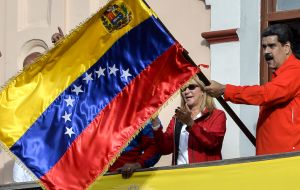MercoPress. South Atlantic News Agency
Corruption remains mainly unchanged in the Americas, according to Transparency International
 At the bottom, Venezuela remains stuck at 18, reflecting systemic and persistent corruption. Venezuela is followed by Haiti (20) and Nicaragua (25)
At the bottom, Venezuela remains stuck at 18, reflecting systemic and persistent corruption. Venezuela is followed by Haiti (20) and Nicaragua (25)  From President Trump and President Bolsonaro to President Jimmy Morales and President Maduro, the Americas region is witnessing a rise in populist trends
From President Trump and President Bolsonaro to President Jimmy Morales and President Maduro, the Americas region is witnessing a rise in populist trends With an average score of 44 for three consecutive years, the Americas region continues to fail in making any serious inroads against corruption, according to the latest report from Transparency International. Compared to other regions, the Americas is similar to Asia Pacific (average score: 44), but behind Western Europe and the European Union (average score: 66).
Canada is consistently a top performer on the Corruption Perceptions Index (CPI), with a score of 81 out of 100 on this year’s index.
The United States remains in second place below Canada, but dramatically drops four points since last year to earn a score of 71, its lowest score in seven years. The US hovers close to Uruguay with a score of 70, and Barbados in the Caribbean, with a score of 68. At the bottom of the index, Venezuela remains stuck at 18,reflecting systemic and persistent corruption across the country.
Venezuela is followed by Haiti (20) and Nicaragua (25) to round out the region’s worst performers.
The number of poor performing countries in the Americas region should come as no surprise given the challenges to the democratic systems and diminishing political rights across North, South and Central America by populist and authoritarian leaders.
From President Trump (US) and President Bolsonaro (Brazil) to President Jimmy Morales (Guatemala) and President Maduro (Venezuela), the Americas region is witnessing a rise in some leaders and leadership styles that favour a number of the following tactics: an undermining of free and independent media, especially when coverage challenges leaders’ messaging; a silencing and control of civil society and international organizations; an increase in voter suppression and disenfranchisement; an increase in anti-immigrant, anti-LGBT, anti-indigenous and racist language; a rise in public promises for simplistic and “strong hand” approaches to solving deep-rooted and complex societal problems, including corruption; an interference with or blunt use of national institutions to weaken the system of checks and balances and increase executive power; an increase in conflicts of interest and private influence.
Unfortunately, this new reality, which is also part of a global trend, is transforming the “way of doing politics” across the region, where authoritarian-style leaders are undermining democratic practices.
But the picture is not as gloomy everywhere in the region. Some countries have made commendable progress in the fight against corruption. While still low, with scores of 34 and 35 respectively, Ecuador and El Salvador both increased their CPI scores by two points since 2017. In addition, with a score of 40, Argentina increased one point since 2017 and eight points since 2015, showing some significant improvement.
In these three countries, the justice sectors are advancing investigations and prosecutions on corruption cases against high profile individuals, including some former presidents. However, these countries also share a common challenge: a need to continue strengthening the independence of their judiciary systems to ensure impartial prosecutions, and that those found guilty of corruption receive appropriate punishment.
While freedom of the media and access to information are more robust in these countries, they could be stronger. These freedoms and liberties are essential for curbing corruption and contribute to a more aware and involved society that includes minorities and vulnerable groups, and that is able to demand accountability from those in power.
In Argentina, our local chapter, Poder Ciudadano, has advocated successfully to guarantee that asset-declarations from public officials’ family members, including children and spouses, are available to the public. Thanks to the chapter’s work, a regressive article of law that regulates asset-declarations was recently declared unconstitutional.
Since 2012, Chile, Mexico and Nicaragua have seen a sharp decline in their respective scores, failing to make significant progress against corruption.
With a score of 25, Nicaragua dropped four points on the CPI in the last seven years. This steady decline reflects the country’s political landscape and recent developments: After more than a decade in power, President Daniel Ortega controls most of Nicaragua’s democratic institutions, curbing their effectiveness and independence. In recent years, the president also clamped down on the political rights of citizens, who despite a violent backlash, have taken to the streets in overwhelming numbers to protest against his authoritarian rule.
With CPI scores of 67 and 28 respectively, Chile and Mexico have experienced a five and six point drop since 2012, respectively. In the past few years, both countries experienced huge corruption scandals. These involved political leaders, including several governors in Mexico, and highly respected sectors traditionally considered free of corruption, such as the Chilean police force.
Chile Transparente, joined a special investigative commission working on the police scandal. Proposed improvements include expanding police trainings to address integrity and ethics issues, and creating an integrity commission capable of operating independently and conducting investigations.
In Mexico, basic political rights, including freedom of expression and press freedom, have sharply declined. Without a free media to provide oversight to government, the ability to prevent and denounce corruption is limited.
Over the past decade, Mexico has witnessed growing social support for anti-corruption reforms. In 2015, these efforts led to constitutional reform and the creation of a new national anti-corruption system.
In the past year, a broad coalition composed by Transparencia Mexicana advocated for the implementation of these reforms and the creation of an independent Attorney General's office.




Top Comments
Disclaimer & comment rules-

Read all commentsMakes PERFECT Political Sense but NOT Economical:
Feb 07th, 2019 - 12:12 pm 0https://jornalorebate.com.br/13810-matematicamente-insustentavel#
Commenting for this story is now closed.
If you have a Facebook account, become a fan and comment on our Facebook Page!